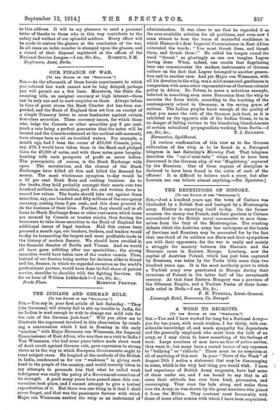OUR FINANCE OF WAR,
[To THE EDITOR OP THA "SPECTATOR."] SIR,—As the aftermath of these heroic experiments to which you referred last week cannot now be long delayed, perhaps you will permit me a few lines. Moratoria, the State dis- counting bills, an assignat currency at high interest—there can be only one end to such empirics as these. Always before in time of great stress the Bank Charter Act has been sus- pended, and the Bank of England thus set free on receipt of a simple Treasury letter to issue banknotes against certain first-class securities. These currency issues, for which those who lodge the Consols or other securities pay 8 per cent. (such a rate being a perfect guarantee that the notes will be burned and the Consols redeemed at the earliest safe moment), have always been as oil on troubled waters. For example, a month ago, had I been the owner of £10,000 Consols, price, say, £70, I would have taken them to the Bank and pledged them for L7,000 of notes, and with these notes gone bargain- hunting with such prospects of profit as never before. The prerequisite, of course, is the Stock Exchange wide open. The moratorium and the closure of the Stock Exchanges have killed all this and killed the demand for money. The most wholesome symptom to-day would be a 10 per cent. Bank Rate and rushing business. As to the banks, they hold probably amongst their assets over two hundred millions in securities, paid for, and written down to record low values. The banks should take out against these securities, say, one hundred and fifty millions of the emergency currency, costing them 8 per cent., and this done proceed to do the business of their lives. Further, they should call in all loans to Stock Exchange firms or other customers, which loans are secured by Consols or trustee stocks, thus forcing the borrowers to take these securities to the Bank of England for additional issues of legal tenders. Had this course been pursued a month ago, our bankers, brokers, and traders would to-day be transacting the largest and most profitable trade in the history of modern finance. We should have revelled in the financial disaster of Berlin and Vienna. And we would all have gone nibbling after our specialities ; the strong securities would have taken care of the weaker vessels. Thus, instead of our finance being matter for derision alike to friend and foe, finance, in which we regarded ourselves as the world's predominant partner, would have done its full share of patriot service, shoulder to shoulder with the fighting Services. Oh for an hour of William Lidderdale !—I am, Sir, &c.,


































 Previous page
Previous page